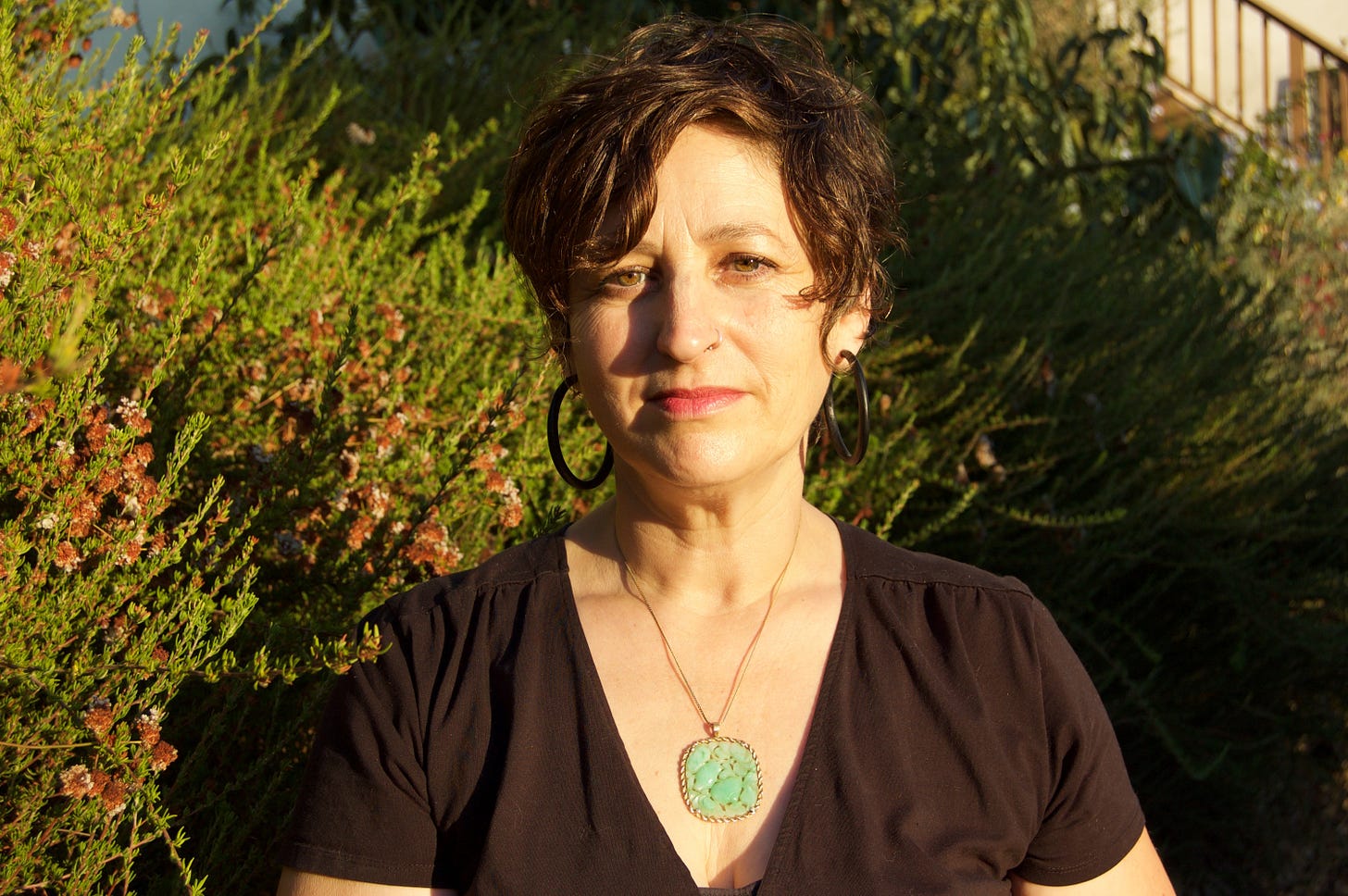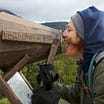I’m delighted that this week’s guest essayist is the memoirist and writer . Tanya has been published in the New York Times, The Guardian, The Telegraph and numerous literary journals. Her debut memoir ZIG-ZAG BOY: MOTHERHOOD, MADNESS AND LETTING GO (Harper Collins/W.W. Norton) charts her journey with her son through the archaic mental health systems of the UK and the USA after his diagnosis of schizoaffective disorder.
When I was eleven, a boy in my class called Andrew Harley threw a half pence piece at me. It bounced off my plimsole and landed with the queen’s head staring up at the artexed school ceiling.
“Jew girl, pick it up,” he shouted. His voice breaking with looming manhood, but early maturation didn’t seem to stop him. If anything it spurred him on, all those surging hormones.
Jews had been typecast as tight fisted and money grabbing long before Andrew thought to toss that half pence at me. But the solid nature of the shiny copper coin made it real, about me, exposing the Jew girl I was, and making me sweat under my nylon blazer. It was true that I looked Ashkenazi Jewish, in an Anne Frank—thick unruly dark hair, earnest brown eyes and prominent nose—kind of way. I even shared Anne’s surname and had Germanic roots on my father’s side. But it was 1976 and we had assimilated so completely that aside from mum making us watch Schindler’s List, and whipping up the odd bowl of chopped liver, I forgot we were Jews.
My father had walked out when I was three, refusing to wear his kippah long before I was born. Mum, equally rebellious, made us bacon rolls with tomato ketchup and bought end-of-day half price sausage rolls from Percy Ingles, canceling the Yiddisher right out of us. But Andrew somehow found it, the thing that hurt the most, and the other boys in our form thought it was hysterical, edging him on to mock the girl that was different.
“I’m not Jewish,” I pleaded with him one afternoon when we happened to be grabbing our coats from the cloakroom at the same time. “It’s just my great, great, great grandfather who was only a quarter Jewish. “Yes, you are, it carries through the maternal line,” he countered.
How did he even know big words like maternal? Ours was an inner city sink school where classes were an exercise in chaos.
For a while I wondered if Andrew Harley was Jewish himself, not only did he understand the terms of religious lineage, but his eyes were as brown as clay, he sported a unibrow, and his moustache was undeniably real, unlike the bum fluff of his peers.
I later discovered that Andrew was of Greek descent, that like me, his family had come from somewhere else. Was it his fear of being found out and bullied that led him to hold so tightly to the frantic coin throwing regimen? A way of hiding his own difference by amplifying mine?
The fact I remember his name, his face, is testament to the trauma of being singled out. Did it make me despise myself a little bit more than I may have done otherwise? Probably. Did it make me see those who were like me, rather than my quintessentially English fair-haired blue-eyed friends, as lesser, as other? I think it did.
With the same degree of passion that Andrew seemed to despise the Jews, my stepfather, Bert loved them. It was Arabs that Bert condemned, and darkies, a term that he picked up from watching Love Thy Neighbour on ITV.
Mum seemed to go along with his views and together they voted for Maggie Thatcher Milk Snatcher. Bert said Maggie would keep the immigrants out and stop them from taking all our houses. I knew that Bert’s politics affected me, but it would be some years before I realized quite how much.
When I was nineteen, Mum encouraged me to go to Israel and stay on a kibbutz. I think she was hoping I might find mispacha, a sense of belonging. Instead, I got into trouble by showing dismay at the way the Israeli army bulldozed the Palestinian homes that were now in Israeli occupied territory. This process enabled my uncle, an immigrant from the UK, to build a huge home on the same land—land that the Zionists called a ‘settlement’.
My uncle and his family wanted me to stay there, to do Aliyah, to learn to speak Ivrit. But l couldn’t conceive of covering my shoulders, my legs, of keeping kosher, of obeying Shabbat. I missed mum. I longed for home.
On my return from the Judaean desert to the urban world of our council estate, I felt changed from what I had seen. The borders, the soldiers, the razor wire.
Mum said the Jewish diaspora needed somewhere to be free after the holocaust and that Israel was the promised land. But even if this were true, at what cost, I wondered, even all those years ago. What kind of fallout was there for the Jews who seemed to be forever on guard with their guns and checkpoints, and how about the collateral damage caused by the occupation of Gaza?
As I busied myself with study in the years that followed, I learned to find words to explain what it meant to be different, to be disenfranchised, and I understood how complicated it all was too. When I came out as a lesbian, I was also a mother of two young sons that I had conceived whilst in a relationship with a man—their father. My younger son in his late teens received a diagnosis of psychosis, and I knew that the archaic mental health system was much more depraved than he was. I no longer hid the fact I was a Jew, one who was conflicted by the atrocities in Israel, levied in the name of Zionism.
None of it was simple, but there was little time to argue with my mum and Bert about it. They both died young, victims of poverty and bad habits.
Five long decades after that half pence piece bounced off my shoe—a coinage which isn’t even in circulation anymore—I sometimes wonder what happened to Andrew, whether he had children, who he became, if he outgrew his childhood antisemitism.
Most of the time now though I try to lean into things more, things that I cannot control, to let go. But just last week I discovered that the so-called far-right thugs who had caused mayhem in Southport, Birmingham and Manchester were threatening to come and wage war on us in Walthamstow. They planned to congregate at the immigration centre on Hoe Street, the place I used to pass as a child with my mum and my little brother, Dan, armed with books of green shield stamps to redeem in Argos for things that we couldn’t otherwise afford. This town was and still is my place of refuge, and it is home to other people who have been perceived of as different too.
No matter how long I sat on my buckwheat filled meditation bolster, I remained angry, frightened, sensing the change that a new political division was creating in the world.
I am not a news junky, but I understand that not all the mob are like the pictures the media portray, toothless big bellied and uneducated. This is not the full story. Nothing is ever this simple. You see, I know some of the people who are coming to our town to attack the refugees and immigrants—who let’s face it, are pretty much all of us in one way or another—because I have lived among them. They are my stepfather and his parents and maybe even his parents’ parents. They are the settlers in the West Bank, or they may as well be.
The Union Jack is still used as a symbol of far-right nationalism, just as it was when I was at school with Andrew. The party was called The National Front back then. The names may have changed, but the sentiments have scarcely shifted.
On the day that the racists are due to arrive, we get messages from the council, the local councilor, the doctor’s surgery, the businesses that are closing early and boarding up their shops. Warnings to tell us that the bigots, the thugs, the idiots, may target our mosques, maybe even my favourite Lebanese restaurant, the pubs, the place I call home. I want to go and join the counter protest, but I imagine being pelted with a brick, getting in a skirmish, being hurt. We are asked to stay away so the police can do their job, but isn’t staying away giving in, backing down, cowardice?
I went to show allegiance in the end, it was once I saw pictures on the news and my local whatsapp feed of the thousands of others from my neighbourhood who were gathered, chanting, banging drums, one of them carrying plasters and bottles of water and contact details for solicitors in case others needed them. I took my wife, a new immigrant here to England. I thought about my grandmother who arrived in the east end from a Shtetl in Russia, poor, hungry, illiterate, hardworking and desperate for protection and inclusion. I saw this little town of mine, of ours, at the end of the Victoria line, through tears. All the brown and black and shades in between, the different dress, languages, the Sultan restaurant with its message in the window telling the Nazi scum to fuck off, and in all the complicatedness of it all, in the ways I had changed, and the ways that I hadn’t, in the ways that this borough has grown, and the way it has remained the same underneath, through all of it I was happy and joyful and proud. Not only did the threat of carnage fail to happen, but we were rewarded for our militant stance. We now have our very own Banksy at the fish and chip shop on Pretoria Road. It is rumoured to be a gift for the stand that we made on the night that the far right threatened to come to our town.
Some days I wonder if the early trauma of being singled out could have made me want to scapegoat others like Andrew did, or if I may have believed like Bert that immigrants were coming here and taking our homes and jobs. I might have missed seeing the flaws in Government and systems, and I might have been unable to come out as queer, been content to watch my son languishing in an archaic mental health system, believing it was helpful not harmful. I might have been one of those wives with my big belly (because I have one) holding up a dustbin lid for protection during one of the riots or throwing fireworks at the police.
Despite everything there seems to be more that binds us than separates us. We can so easily cross the territory that takes us from sanity to insanity, from political party to political party. For now all I can say is that in all the mayhem and division of life and humanity, I am humble and grateful to be me.
Being taunted by Andrew all those years ago taught me about power and vulnerability, about resilience and difference, about fighting and about letting go.
writes on the intersection of motherhood, disability and immigration, using memoir and personal essay as a tool to aid self-expression and recovery, and to fight the deep-rooted prejudice our society holds against psychosis.
Subscribe to Tanya’s substack here.
Order Tanya’s memoir here.







Thank you so much for this gift.
I am a Quaker, and glad to be able to love all as equals.
I am so proud of you ms frank x
I’m so proud to be one of my very bestest friends x
I love you like a sister x
You are a warrior 💝💝💝💝